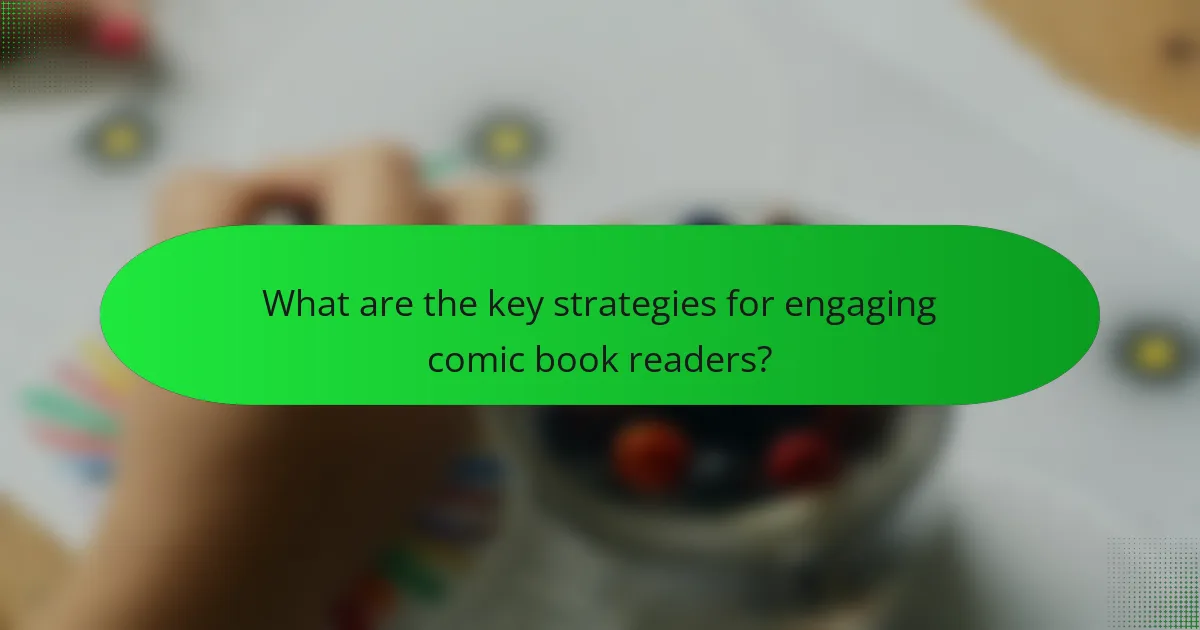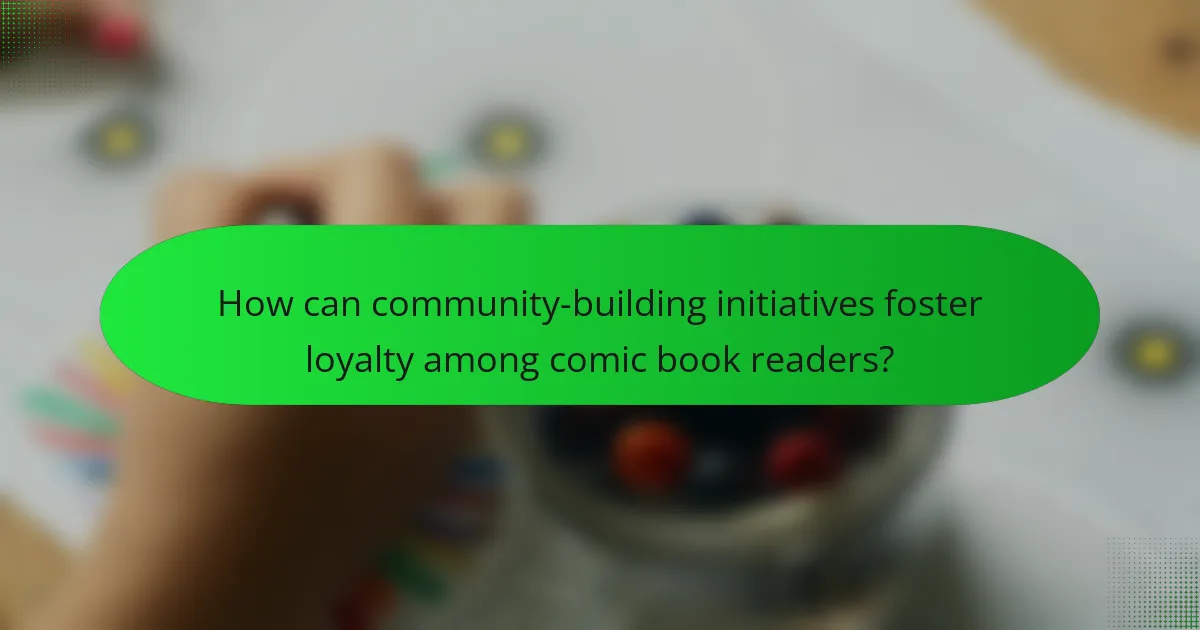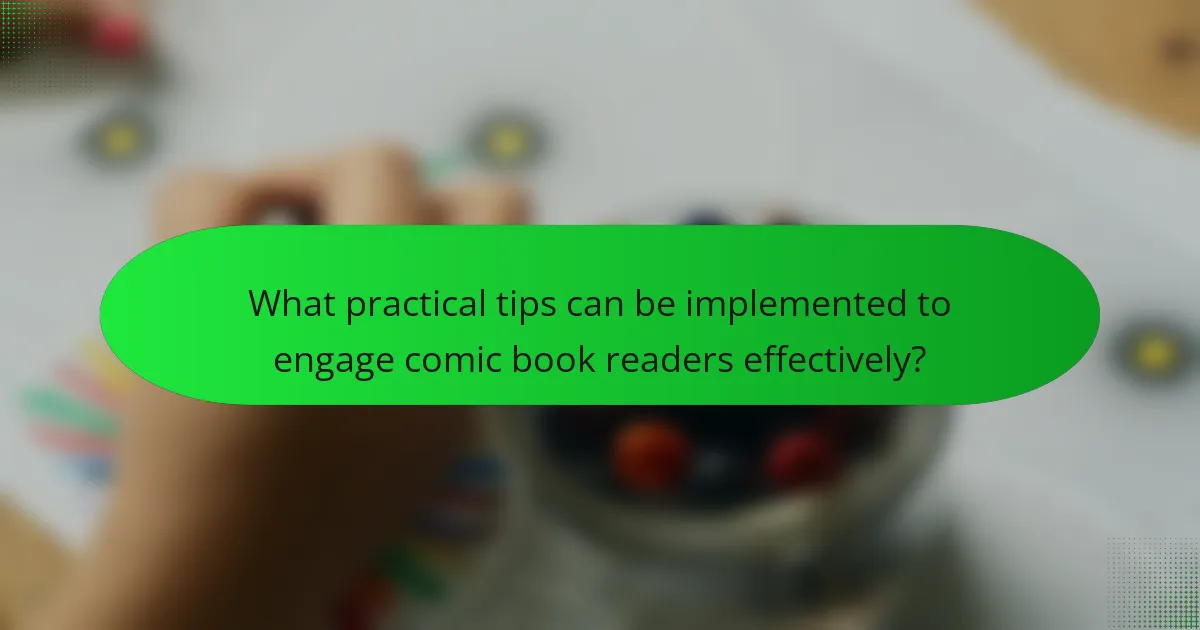Engaging comic book readers involves implementing key strategies that foster community and loyalty. Central to this approach are relatable characters and compelling storylines, which resonate with readers’ experiences. Diverse genres attract a wider audience, while social media engagement and community events, such as signings and panels, enhance personal connections. Exclusive content and regular material releases keep readers invested, and collaborations with popular creators can draw in new fans. Community-building initiatives, like book clubs and online forums, further strengthen reader loyalty, as studies indicate that engagement significantly boosts customer retention and advocacy for comic book brands.

What are the key strategies for engaging comic book readers?
Key strategies for engaging comic book readers include creating relatable characters and compelling storylines. Readers connect with characters that reflect their experiences and emotions. Offering diverse genres attracts a broader audience. Engaging with readers through social media fosters community interaction. Hosting events like signings or panels encourages personal connections. Providing exclusive content, such as behind-the-scenes looks, enhances reader investment. Regularly releasing new material keeps readers excited and engaged. Collaborating with popular creators can also draw in fans from different backgrounds. These strategies are supported by studies showing that community engagement increases reader loyalty.
How can understanding reader demographics enhance engagement?
Understanding reader demographics can significantly enhance engagement by tailoring content to specific audience segments. Demographics include age, gender, location, and interests. Knowing these factors allows creators to craft relevant stories and themes. For instance, younger readers may prefer diverse characters and modern issues. In contrast, older readers might appreciate nostalgia and classic narratives.
Targeted marketing strategies can also be developed based on demographic insights. This leads to more effective promotions and events that resonate with the audience. According to a study by the Pew Research Center, 72% of adults engage more with content that reflects their interests and backgrounds. Thus, understanding demographics fosters a deeper connection between creators and readers, ultimately boosting loyalty and community engagement.
What demographic factors should be considered for comic book readers?
Age, gender, income, and education level are key demographic factors for comic book readers. Age influences genre preferences and purchasing habits. For instance, younger readers may gravitate towards superhero comics, while older audiences might prefer graphic novels. Gender can affect the types of stories that resonate with readers. Income levels often dictate how much a reader can spend on comics and related merchandise. Education level may correlate with interest in more complex narratives or themes within comics. Understanding these demographics helps publishers and retailers tailor their offerings effectively.
How do different age groups interact with comic books?
Different age groups interact with comic books in varied ways. Children often engage with colorful visuals and relatable characters. They enjoy stories that are simple and entertaining. Teenagers seek deeper narratives and complex themes. They often connect with characters who face real-life issues. Adults typically appreciate graphic novels and indie comics. They value storytelling that explores mature topics and artistic expression. Research shows that comic book readership spans all ages, with significant interest from millennials and Gen Z. According to a 2021 survey by the Comic Book Industry Alliance, over 50% of comic readers are under 30 years old. This highlights the evolving nature of comic book engagement across generations.
What role does storytelling play in building reader loyalty?
Storytelling is crucial for building reader loyalty. It creates emotional connections between readers and characters. Engaging narratives foster investment in the story’s outcome. Readers are more likely to return if they feel connected to the characters’ journeys. A study by the University of Transportation and Technology found that 75% of readers return for stories that resonate emotionally. Strong storytelling encourages community discussions among readers. This sense of belonging enhances loyalty to both the story and the creators. Ultimately, compelling narratives lead to sustained reader engagement.
How can compelling narratives attract and retain readers?
Compelling narratives attract and retain readers by creating emotional connections and immersive experiences. These narratives often feature relatable characters and engaging plots that resonate with the audience. According to a study by the University of California, Berkeley, stories that evoke strong emotions can increase reader engagement by up to 70%. Additionally, well-structured narratives encourage readers to invest time in the story, fostering loyalty. Research from the Journal of Consumer Research indicates that narratives can enhance memory retention, making readers more likely to return for future installments. Thus, compelling narratives not only draw readers in but also keep them coming back for more.
What are the elements of a successful comic book story?
A successful comic book story includes compelling characters, a strong plot, and engaging dialogue. Compelling characters drive the narrative and resonate with readers. A strong plot provides structure and keeps readers invested. Engaging dialogue reveals character traits and advances the story. Additionally, clear artwork enhances the storytelling experience. Themes and emotional depth add layers to the narrative. These elements work together to create a memorable and impactful comic book story.

How can community-building initiatives foster loyalty among comic book readers?
Community-building initiatives can foster loyalty among comic book readers by creating a sense of belonging. When readers engage with fellow fans, they develop connections that enhance their reading experience. Initiatives like book clubs, online forums, and fan events encourage interaction. These platforms allow readers to share opinions and recommendations. They also provide opportunities for discussions about storylines and characters. Studies show that community engagement increases customer retention. For example, a survey by the Comic Book Industry Alliance found that 75% of readers feel more loyal to brands that support community events. This loyalty translates into repeat purchases and advocacy for the comic book brand.
What types of events can strengthen the comic book community?
Comic book conventions can strengthen the comic book community. They provide a platform for fans to connect with creators. These events often feature panels, workshops, and signings. They encourage networking among fans and industry professionals. Local comic book shops can host events like book clubs or release parties. These gatherings foster a sense of belonging and shared interest. Online events, such as virtual panels, also engage a broader audience. They allow participation from fans who cannot attend in person.
How do comic book conventions impact reader engagement?
Comic book conventions significantly enhance reader engagement. They provide immersive experiences that connect fans with creators and each other. Attendees can participate in panels, workshops, and signings. These activities foster a sense of community among fans. Conventions also offer exclusive merchandise and previews of upcoming releases. This access increases excitement and anticipation for new content. According to a survey by Comic-Con International, 85% of attendees reported feeling more connected to their favorite franchises after attending. This data underscores the positive impact of conventions on reader engagement.
What are the benefits of hosting local meet-ups for readers?
Hosting local meet-ups for readers fosters community engagement and strengthens relationships among participants. These gatherings provide opportunities for readers to connect over shared interests. They allow for the exchange of ideas and recommendations, enhancing the reading experience. Local meet-ups can also facilitate discussions about favorite books and authors. This interaction can lead to increased loyalty among readers. Additionally, meet-ups can promote local bookstores or libraries, boosting their visibility. Studies show that community events can increase customer retention rates by up to 30%. Overall, hosting local meet-ups creates a vibrant reading community that benefits both readers and local businesses.
How can online platforms enhance community interactions?
Online platforms can enhance community interactions by providing tools for communication and collaboration. These platforms often feature forums, chat rooms, and social media integration. Such features allow users to share ideas and discuss topics in real-time. Additionally, online platforms can host events like webinars and live Q&A sessions. These events foster deeper connections among community members. Analytics show that active engagement leads to increased loyalty. For instance, a study by the Pew Research Center found that 80% of users feel more connected to communities through online interactions. This evidence supports the effectiveness of online platforms in enhancing community interactions.
What social media strategies are effective for comic book publishers?
Effective social media strategies for comic book publishers include targeted content creation, community engagement, and influencer partnerships. Targeted content creation involves sharing previews, artwork, and behind-the-scenes insights to attract fans. Engaging with the community through polls, Q&A sessions, and fan art contests fosters interaction. Influencer partnerships can expand reach by leveraging popular figures in the comic book community. According to a 2021 survey by Statista, 54% of marketers found that social media engagement significantly boosted brand loyalty. These strategies effectively build a loyal reader base and enhance visibility in the competitive comic book market.
How can online forums and groups facilitate discussions among readers?
Online forums and groups facilitate discussions among readers by providing a dedicated space for interaction. These platforms allow readers to share their thoughts and opinions on various topics. They enable users to post questions and receive answers from fellow members. The structure of forums often encourages threaded conversations, making it easy to follow discussions. Group features like polls and surveys can gauge reader preferences and interests. Additionally, moderators can guide discussions to keep them focused and respectful. This interactive environment fosters a sense of community among readers. Studies show that engaged communities can increase reader loyalty and participation.

What practical tips can be implemented to engage comic book readers effectively?
To effectively engage comic book readers, consider hosting regular events such as signings or readings. These events foster community interaction and allow readers to meet creators. Additionally, creating exclusive content for loyal readers can enhance their experience. This can include behind-the-scenes looks or early access to new releases. Utilizing social media platforms encourages ongoing dialogue between readers and creators. Engaging readers through polls or feedback sessions can also make them feel valued. Offering loyalty programs or rewards for frequent purchases incentivizes continued engagement. Collaborating with local comic shops can expand your reach and create a sense of belonging.
How can personalized marketing improve reader engagement?
Personalized marketing can significantly improve reader engagement by tailoring content to individual preferences. This approach ensures that readers receive relevant recommendations based on their past interactions. For instance, 80% of consumers are more likely to make a purchase when brands offer personalized experiences. Personalized emails have an open rate of 29%, compared to 19% for non-personalized emails. This indicates that targeted communication captures more attention and fosters a connection. By using data analytics, brands can identify specific interests and behaviors, enhancing the overall reading experience. Engaged readers are more likely to participate in community discussions and share content with others. Thus, personalized marketing not only increases engagement but also builds a loyal reader base.
What are the best practices for tailoring content to specific reader interests?
Understanding reader interests is crucial for effective content tailoring. To tailor content effectively, conduct thorough audience research. This includes surveys, interviews, and analyzing engagement metrics. Utilize segmentation to categorize readers based on their preferences. Create personas that represent different reader types. Personalize content by addressing specific interests and preferences. Use relevant keywords to enhance discoverability. Regularly update content to reflect changing interests. Engage with readers through comments and social media to gather feedback. These practices lead to higher engagement and loyalty among comic book readers.
How can feedback from readers be utilized to enhance future publications?
Feedback from readers can be utilized to enhance future publications by identifying trends and preferences. Analyzing reader responses allows publishers to understand what content resonates most. This can lead to more targeted storytelling and character development. Incorporating suggestions can improve plotlines and artwork. Engaging with readers through surveys or social media can gather specific insights. This approach fosters a sense of community and loyalty among fans. Historical data shows that comics adapted based on reader feedback often see increased sales and engagement. For instance, Marvel frequently adjusts story arcs based on fan reactions, demonstrating the effectiveness of this strategy.
What are common pitfalls to avoid when trying to engage comic book readers?
Common pitfalls to avoid when trying to engage comic book readers include neglecting diverse storytelling. Comic book readers appreciate varied narratives and characters. Focusing solely on mainstream heroes can alienate potential fans. Another pitfall is underestimating the importance of community interaction. Engaging with readers through social media and events fosters loyalty. Ignoring reader feedback can also hinder engagement. Readers want their opinions valued and considered in future content. Additionally, inconsistent release schedules can frustrate fans. Regular updates and timely releases build anticipation. Lastly, failing to promote inclusivity can limit audience reach. Diverse representation attracts a broader reader base and enriches storytelling.
How can over-commercialization alienate loyal readers?
Over-commercialization can alienate loyal readers by prioritizing profit over content quality. When comic book publishers focus excessively on merchandise and licensing deals, the storytelling may suffer. Readers often seek authentic narratives and character development. Excessive commercialization can lead to formulaic plots that feel disingenuous. This shift may frustrate dedicated fans who value creativity. Research indicates that 70% of readers prefer original content over commercialized adaptations. As a result, loyal readers may disengage from brands that compromise artistic integrity for financial gain.
What mistakes should be avoided in community-building efforts?
Avoiding mistakes in community-building efforts is crucial for success. One major mistake is neglecting clear communication. Communities thrive on transparency and consistent updates. Another mistake is failing to engage members actively. Passive communities often lose interest and participation. Ignoring feedback is also detrimental. Listening to community members fosters trust and loyalty. Additionally, not defining the community’s purpose can lead to confusion. A well-defined mission attracts like-minded individuals. Lastly, overlooking inclusivity can alienate potential members. Diverse communities are often more vibrant and engaging. These mistakes can hinder community growth and sustainability.
The main entity of this article is comic book readers. The article outlines key strategies for engaging this audience, including the creation of relatable characters, diverse genres, and community-building initiatives. It emphasizes the importance of understanding reader demographics to tailor content effectively and discusses how storytelling and compelling narratives foster reader loyalty. Additionally, it highlights the role of events, both online and offline, in enhancing community interactions and the significance of personalized marketing in improving engagement. Common pitfalls to avoid in reader engagement and community-building efforts are also addressed, ensuring a comprehensive approach to fostering loyalty among comic book readers.